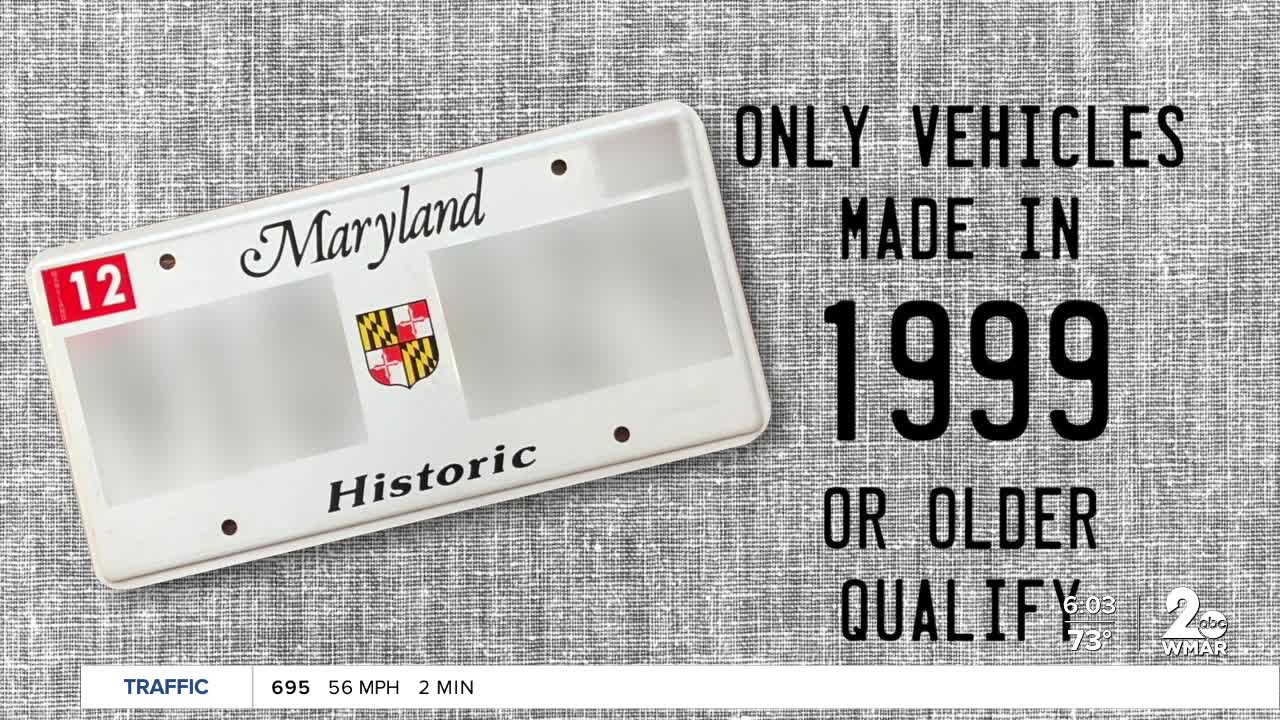BALTIMORE — Thousands of Maryland drivers will soon need to replace their historic vehicle tags following a significant policy change.
Previously, vehicles needed to be at least 20 years old to qualify for historic car tags. As of July 1, vehicles must be model year 1999 or older to qualify for historic car tags, a change that affects approximately 72,000 vehicles, or one-third of all current historic tag holders in the state.
"They're still just normal cars on the street," said Phil Blackiston, president of Maryland Tag and Title. "It's not an historic, it's not a classic, it's not a collector's car."
Blackiston explained why so many drivers have registered under this designation: "No inspection, no vehicle emissions. Cheaper registration, less expensive insurance."
New registrations for historic cars have steadily increased, rising from 48,488 in 2022 to 58,690 in 2024. As of June 30, there were 197,968 historic vehicles with active Maryland registrations, compared to 5 million total registrations statewide.
The growing number of vehicles with historic tags raised safety concerns. "The cars that are on the road with historic tags on them that people are driving may not be safe to drive, which causes accidents, costs lives. It's serious," said Blackiston.
Maryland has now tightened restrictions by setting a fixed cutoff year rather than a rolling age requirement. Only vehicles from 1999 or earlier will qualify for historic status. Currently, 125,544 historic vehicles with active Maryland registrations are model year 1999 or earlier.
"We had a customer last week that had a 2000 car who said, 'Oh, well, I'll just wait till next year and then my car will be old enough.' We said, 'No, it's 1999 or older,'" said Blackiston.
According to the Maryland Motor Vehicle Administration, changing the qualifying year would require new legislation. The current change was passed as part of the state budget bill, with lawmakers expecting it to generate $6 million annually.
"This legislation reduces the number of eligible vehicles, thereby reducing opportunities for improper registration. While the MVA is not the enforcing authority for historic plate misuse, customers that register their vehicles for reasons other than its intended purposes diminishes the program’s value for the customers that properly maintain their vehicles for exhibitions and club activities," said an MVA spokesperson in an email to WMAR-2 News Mallory Sofastaii.
While Blackiston supports stricter standards, he warns this won't necessarily boost his business. "We are also seeing, immediately, more Virginia plates on back of cars. It's cheap," said Blackiston.
Maryland has nearly doubled its registration fees in just two years — from $67.50 in 2023 to $120.50 as of July 1, 2025. By comparison, Virginia charges just $40 for vehicle registration.
READ MORE: Maryland vehicle registration fees going up for the second year in a row, starting tomorrow
In response, an MVA spokesperson said, "It is important to remind the public that under Maryland law, all state residents must register their vehicles with the Maryland Motor Vehicle Administration (MVA). Driving a car without proper vehicle registration in Maryland is considered a criminal misdemeanor and is in violation of state law. We will continue to work with law enforcement, and local jurisdictions on appropriate enforcement actions to improve compliance."
Drivers with historic tags who are no longer eligible can keep their current tags until they expire. At that point, they'll need to get a standard registration and a safety inspection — if there's not one already on file.
The Specialty Equipment Market Association (SEMA) supports this change. In an email, a spokesperson wrote:
"SEMA believes that any efforts that help preserve our nation’s rich car culture are important to consider and support. The Maryland change represents a common-sense approach to providing structure to what is considered a historic, collector-worthy vehicle. The 1999 cutoff enables great cars from the 1980s and 90s to remain on the road for future generations to enjoy, while also removing some of the grey areas from the law that were not in the spirit of historical preservation."
This story was reported by a journalist and has been converted to this platform with the assistance of AI. Our editorial team verifies all reporting on all platforms for fairness and accuracy.




